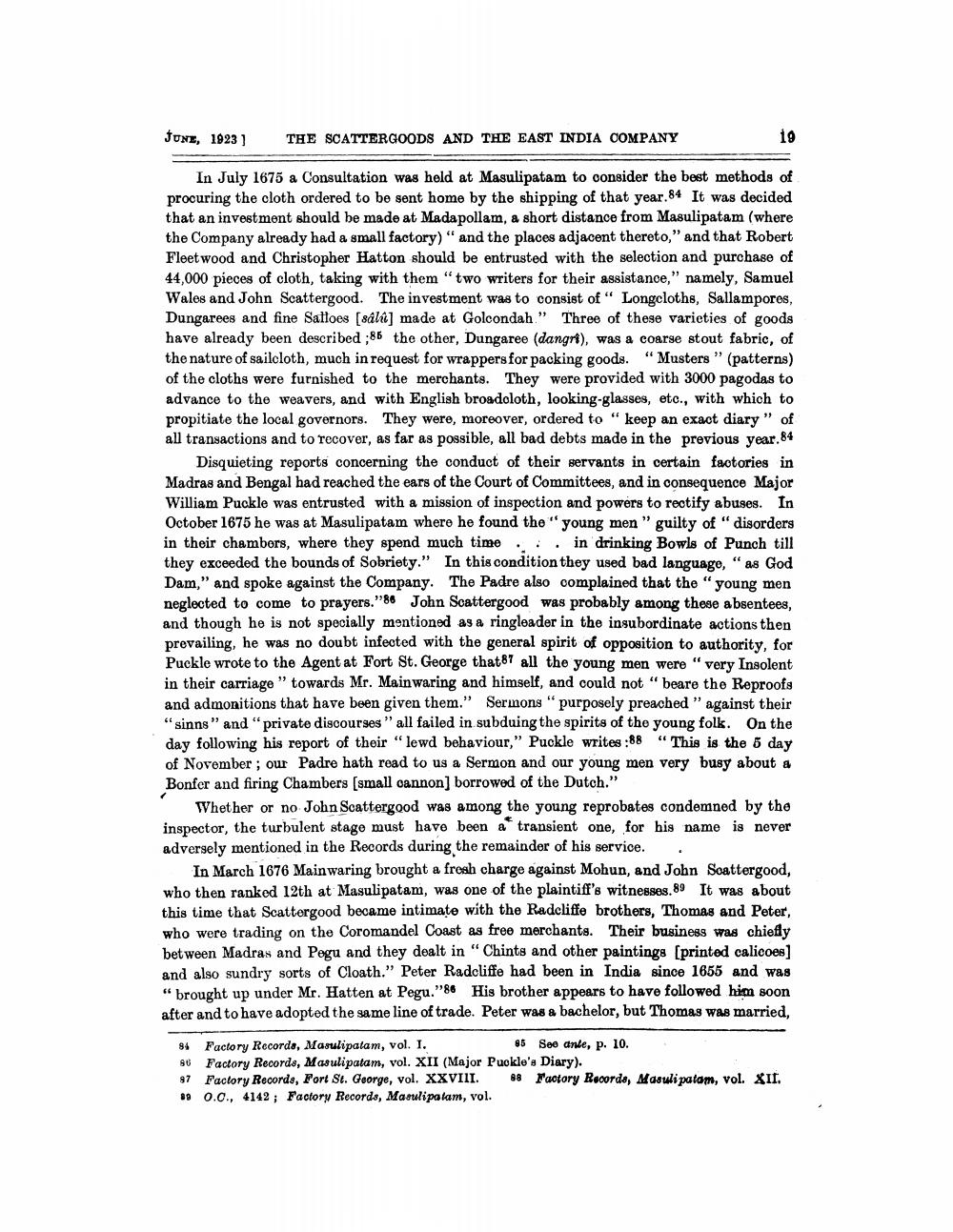________________
19
JUNE, 1923]
THE SCATTERGOODS AND THE EAST INDIA COMPANY
In July 1675 a Consultation was held at Masulipatam to consider the best methods of procuring the cloth ordered to be sent home by the shipping of that year. 84 It was decided that an investment should be made at Madapollam, a short distance from Masulipatam (where the Company already had a small factory)" and the places adjacent thereto," and that Robert Fleetwood and Christopher Hatton should be entrusted with the selection and purchase of 44,000 pieces of cloth, taking with them "two writers for their assistance," namely, Samuel Wales and John Scattergood. The investment was to consist of" Longcloths, Sallampores, Dungarees and fine Salloes [sal] made at Golcondah." Three of these varieties of goods have already been described;85 the other, Dungaree (dangri), was a coarse stout fabric, of the nature of sailcloth, much in request for wrappers for packing goods. "Musters" (patterns) of the cloths were furnished to the merchants. They were provided with 3000 pagodas to advance to the weavers, and with English broadcloth, looking-glasses, etc., with which to propitiate the local governors. They were, moreover, ordered to "keep an exact diary" of all transactions and to recover, as far as possible, all bad debts made in the previous year.84
Disquieting reports concerning the conduct of their servants in certain factories in Madras and Bengal had reached the ears of the Court of Committees, and in consequence Major William Puckle was entrusted with a mission of inspection and powers to rectify abuses. In October 1675 he was at Masulipatam where he found the "young men " guilty of "disorders in their chambers, where they spend much time... in drinking Bowls of Punch till they exceeded the bounds of Sobriety." In this condition they used bad language, "as God Dam," and spoke against the Company. The Padre also complained that the "young men neglected to come to prayers."88 John Scattergood was probably among these absentees, and though he is not specially mentioned as a ringleader in the insubordinate actions then prevailing, he was no doubt infected with the general spirit of opposition to authority, for Puckle wrote to the Agent at Fort St. George that87 all the young men were "very Insolent in their carriage" towards Mr. Mainwaring and himself, and could not "beare the Reproofs and admonitions that have been given them." Sermons "purposely preached" against their "sinns" and "private discourses" all failed in subduing the spirits of the young folk. On the day following his report of their "lewd behaviour," Puckle writes:88 "This is the 5 day of November; our Padre hath read to us a Sermon and our young men very busy about a Bonfer and firing Chambers [small cannon] borrowed of the Dutch."
Whether or no John Scattergood was among the young reprobates condemned by the inspector, the turbulent stage must have been a transient one, for his name is never adversely mentioned in the Records during the remainder of his service.
In March 1676 Mainwaring brought a fresh charge against Mohun, and John Scattergood, who then ranked 12th at Masulipatam, was one of the plaintiff's witnesses. 89 It was about this time that Scattergood became intimate with the Radcliffe brothers, Thomas and Peter, who were trading on the Coromandel Coast as free merchants. Their business was chiefly between Madras and Pegu and they dealt in "Chints and other paintings [printed calicoes] and also sundry sorts of Cloath." Peter Radcliffe had been in India since 1655 and was "brought up under Mr. Hatten at Pegu."86 His brother appears to have followed him soon after and to have adopted the same line of trade. Peter was a bachelor, but Thomas was married,
94 Factory Records, Masulipatam, vol. I.
85 See ante, p. 10.
86 Factory Records, Masulipatam, vol. XII (Major Puckle's Diary). 87 Factory Records, Fort St. George, vol. XXVIII. 88 Factory Records, Masulipatam, vol. XII. 89 O.C., 4142; Factory Records, Masulipatam, vol.




